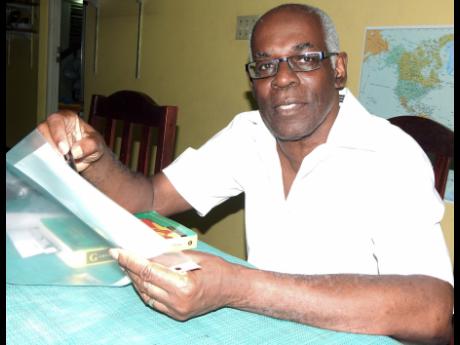For the Reckord | Marcus Garvey and the performing arts (pt 1)
(This is the first of a two-part article based on an interview with Rupert Lewis, the University of the West Indies (UWI) professor emeritus in political thought, who has produced three books and numerous articles on National Hero Marcus Garvey and is now writing "a short biography" on him.)
"I regard Garvey as a performing artist himself," Professor Emeritus, Rupert Lewis said a week ago when I asked him about Garvey's relationship with the performing arts.
Now Jamaica's first National Hero is generally thought of in more sombre terms - as a visionary, philosopher, political leader, writer, publisher and founder of the pioneering Universal Negro Improvement Association (UNIA). However, Lewis offered loads of evidence for his assertion, beginning with Garvey's interest in public speaking.
"He was very much into the art of public oratory, and there were parish competitions at the start of the 20th century, which he participated in and won some prizes. Some of his best friends in West Kingston, where he lived when he first came to the city, were also elocutionists and singers," Lewis said.
They included the McCormack family. Two McCormack brothers, one a bass and the other one a tenor singer, were among the founding members of the UNIA. Lewis stressed that people who were in the performing arts were in the organisation at the outset.
He added: "The organisation functioned from the start and throughout Garvey's life in a cultural programme, one deeply rooted in Jamaican traditions - church traditions, tea party traditions, educational and school traditions. The learning of poems and the articulation of the English language through poetry was the art form that he and others, like his first wife, Amy Ashwood Garvey, also a founding UNIA member, were very good at."
DIVERSE MUSICIANS
Lewis also mentioned American Shakespearean orator Henrietta Vinton Davis (former secretary to the renowned abolitionist Frederick Douglass), who later became the international organiser of Garvey's movement. Garvey met her when she came to Jamaica around 1912 to perform at the Ward Theatre and elsewhere in the island.
When Garvey went to the USA in 1916, he drew diverse musicians around him, including singers of classical and jazz music and instrumentalists. Garvey's public talks were "always preceded or followed by performances", Lewis said. "His very speech was a performance."
Accompanying the elocution sessions were debate competitions on all kinds of topics. Amy Ashwood defeated Garvey in a debate at East Queen Street Baptist Church, Kingston. "She was quite good," Lewis chuckled.
He said Garvey wrote what were called "poetic meditations", composing them, for the most part, while imprisoned in Atlanta from 1925 -1927. They were performed both in the US and later when he returned to Jamaica.
Some pieces which started out as poetry were later put to music. One was the well-known Keep Cool, which Lewis told me he saw performed in dance by Jamaica's National Dance Theatre Company (NDTC).
Garvey also wrote hymns and contributed his "fair share" to the UNIA's hymnody. Unfortunately, there is no collection of the hymns, which included the UNIA anthem Ethiopia, Land of our Fathers, and there is a single collection of Garvey's verse, which was published posthumously by another Garvey scholar, Tony Martin.
Lewis said that while he has no evidence that Garvey wrote music himself, "he had people around him who put his material to music." He then showed me a Daily Gleaner advertisement he had recently come across for a "music and poetic programme" produced by Garvey in collaboration with a former bandmaster of the West India Regiment at the Ward Theatre in 1934.
"At the 1934 convention, he [Garvey] makes a speech saying the race cannot only pay attention to the political, the economic, the religious; it has to pay equal attention to the arts. That's explicitly stated in the convention held in Kingston. The arts was, for him, the vehicle that would connect with people on a creative level," Lewis said.
Next week: Garvey the playwright, producer and publisher.




